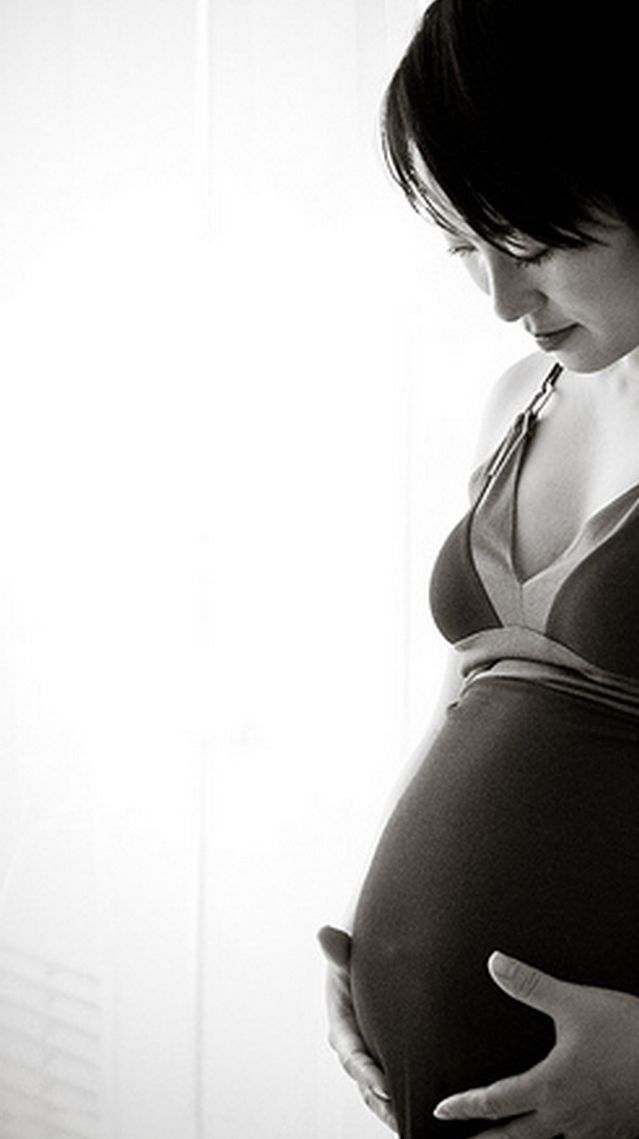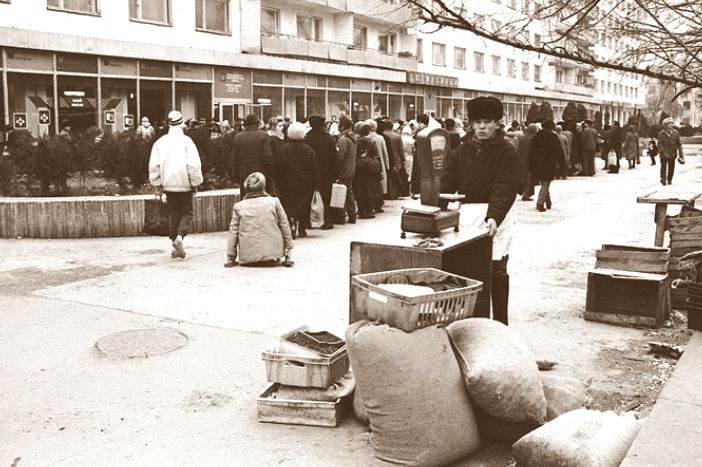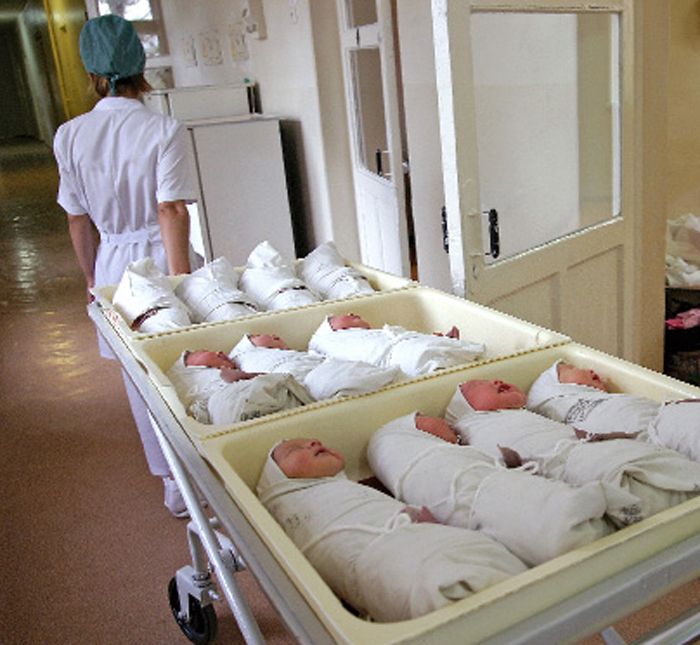 20 years is not that big period, but changes young mums saw are simply amazing...
20 years is not that big period, but changes young mums saw are simply amazing...
THE LAST YEAR IN USSR
A working woman very soon gets used to planning pregnancy in parallel with preparing quarter reports. She tries to productively work with a baby inside and go on maternity leave as late as possible aiming to win bigger benefits.
In 1991, should such thoughts appear in mind, a woman would discuss it with public -- it was normal to get maternity leave on a day the gynecologist prescribed and not to show up in office until the baby turns three years old.
Natalya SMIRNOVA received benefits for pregnancy and baby care before giving birth to her child and could afford standing in queues for then deficient soap, powder, food and other stuff with safe conscience.
What could she buy with the benefits at hand? -- She could not recall exactly what, but remembers the sum wasn’t small. In addition, Natalya monthly received extra benefits for half a year while things at her work were going ok and the payments were quite enough to buy clothes for sewing diapers and food for nursing mothers.
Her office was located at Satpayev Avenue, not far from a food shop, which often had goods that generally were in scarcity.
“It was the first shop in our city to work as a supermarket -- clients would walk in aisles and take anything instead of asking a salesperson to pass a thing you liked from counters. It always had something new -- sweets, ketchup, marinated stuff from Bulgaria, stewed fruits and various exotic goodies. As I fed my kid with breast milk, I could enjoy all money without a twinge of conscience” she laughs.
It was the times when women used to sew diapers for their kids. Soviet methodology guided that at the age of three months baby’s diet should include strained apples, yolks mashed in milk, mashed potatoes, carrots and cabbage. Baby food from shops was limited to Malysh, an infant milk of Russian production. Young infants were also given thin semolina or rice porridge boiled in milk.
Due to lack of special clothes, babies used to be ‘kept’ in linens until the age of one. Now mums of young infants can go to pool, café or restaurant, visit friends -- enjoy a full life, whereas in that time, no one would take infants anywhere, except polyclinics. Carrying bunches of linens and creepers with you wasn’t an easy job.
“One day I saw a tumultuous crowd of women at Detski Mir Mall (close to Kurmangazy Alley). As it turned they were standing in line for newly arrived baby clothes. I managed to buy two for my kid -- they wouldn’t sell more to one person, says Natalya. – I used to go to Polyclinic #2 to monitor my pregnancy. Fortunately, I had no problems with my health. But I hardly got to maternity home -- the ambulance made me wait for three hours after a call, when it came we couldn’t get to the other bank due to much snow on the then only central bridge. I was taken to old maternity home (today the museum at the Arbat, behind Ak Zhaik Hotel) but not accepted because it was busy. Eventually we reached the new maternity home in Avangard having driven over the bypass bridge. The new birthing home had no water, therefore they released all those who had smooth birth on the second day.”
COMPARING 1995 AND 2009
Today, Gulmira KUBEYEVA is an experienced mother of three, who may compare how is it like to be pregnant in 1995, 2003 and 2009. Her first pregnancy was accompanied with an unknown disease that nearly made her crazy and deprived her of sleep. Entire body itched, especially hands and feet. At nights the itching grew stronger and she never had a proper sleep until the very day of baby birth.
“Now it is a widely known disease called hepatosis of pregnancy. My doctor simply couldn’t recommend me what to do, as I was her first patient with such a complaint. Owing to this, she sent me to maternity home a month before the birth. Imagine the psychological condition of a young woman who never had children and placed in a closed facility for a long time due to ‘unknown disease’.
Luckily, the doctors there well knew about the disease -- Ms Bella BELKINA established diagnosis and defined a treatment for me: diet, permanent control and tranquilizers. During the following pregnancies I knew what to do: I regularly visited private clinics, properly controlled my condition, browsed relevant online forums -- at last there were many women with such a problem. Feature of the disease is it disappears right after a birth” she says.
There weren’t pregnancy tests not to mention decent pharmacies. Therefore only a doctor could confirm pregnancy.
In 1995, doctors could not diagnose intercranial pressure and hyperactivity of children.
“Now seeing the behavior of my daughter, whom a neuropathologist diagnosed as having the above features, I understand that my eldest son has had similar problem: he used to walk on tiptoes, his chin would twitch when crying, and lips would turn blue. Instinctively, I managed to create conditions that helped him get better -- I used to walk him much and did my best to keep him away from stress. Now Damir is my pride -- a very calm and educated boy, who studies well and sees far and wide” concludes Gulmira.
CHILDREN OF UNEMPLOYMENT AND DEFICIENCY
In nineties, the country was struggling to survive -- it was not in a position to think of  demographic policy, believes Aizada AKHMEDOVA. – The society treated us in similar way -- ‘pregnancy and birth is your sole business, do not ask something special for you at your work.’ Women used to hide their pregnancy as long as possible, fearing they would be sacked -- employers wouldn’t want to pay pre-birth and after-birth benefits at company’s expense.
demographic policy, believes Aizada AKHMEDOVA. – The society treated us in similar way -- ‘pregnancy and birth is your sole business, do not ask something special for you at your work.’ Women used to hide their pregnancy as long as possible, fearing they would be sacked -- employers wouldn’t want to pay pre-birth and after-birth benefits at company’s expense.
Even husbands used to feel shy to accompany their wives visiting a gynecologist.
Today, nobody may fire a 12-week pregnant woman from work. Her job is preserved for up to 3 years. Every three hours she may leave her workplace to feed her baby. A woman who works till maternity leave day receives good benefits.
In mid nineties ultrasonography was far from perfection. Then experienced ultrasonographer took seven-month-pregnant Aizada’s boy for a girl. Now they can unmistakably establish a child’s sex at earlier stages of pregnancy and ‘see’ premature defects, what’s more important.
“Society suffered from high unemployment and reduction of staff everywhere. Mothers used to sit at home with children -- getting a place in kindergarten for your kid was a luxury. Once I took maternity leave in 1991 and never returned giving birth to another two in 1996 and 1998, says Bibigul AMIROVA. – It made no sense to come back to work -- my husband wasn’t paid salaries for months or they would pay him with some goods instead. We had plenty of unpaid bills as many others had. I used to cut hair of my husband and children at home, to save money.
There wasn’t big choice in clothes -- Uzbekistan made flannelette vests used to lose color after first washing. Some people could afford ordering all clothes, baby strollers, pacifiers and baby bottles from Pakistan and Turkey via familiar shuttle traders. The others used to sew these on their own. No one even had the idea that there existed wet wipes, anti diaper rash creams and special underwear for pregnant women.”
“Barter was a common word for the times. My younger brother who worked at the plant used to receive salary in the form of coats or children’s mashed food, which he used to give to me and I used to sell them. We had constant money shortage through 2000s. Then life got better -- we repaid our debts, they no longer delayed paying salaries to my husband and eventually I returned to work. However, we failed to send our youngest son to kindergarten -- the one next to our home was given to some government agency”
2004
Shynar KAIRZHANOVA believes she was lucky to be pregnant in 2004. Who knows would doctors manage to save her daughter Dilnaz if she was born a couple of years earlier?
 “I couldn’t even register my pregnancy in my polyclinic -- when I came to see the gynecologist they immediately hospitalized me. I spent greater period of my pregnancy in hospitals due to high arterial and kidney pressure. My condition was steadily worsening and at the sixth month doctors said ‘Enough, we will stimulate birth, otherwise you may lose not only the child, but your life as well.’ Terrified, I couldn’t fall asleep the following night. With a morning blood pressure of 160-140 I gave birth to a girl of 850gr weight and 30cm height. She spent one month in emergency room with a respirator. I was only allowed to hold her when she gained weight to become 1200gr, in order to ‘set contact between mother and child’ as the doctors said. We were discharged after two months when Dilnaz gained 2 kilos.
“I couldn’t even register my pregnancy in my polyclinic -- when I came to see the gynecologist they immediately hospitalized me. I spent greater period of my pregnancy in hospitals due to high arterial and kidney pressure. My condition was steadily worsening and at the sixth month doctors said ‘Enough, we will stimulate birth, otherwise you may lose not only the child, but your life as well.’ Terrified, I couldn’t fall asleep the following night. With a morning blood pressure of 160-140 I gave birth to a girl of 850gr weight and 30cm height. She spent one month in emergency room with a respirator. I was only allowed to hold her when she gained weight to become 1200gr, in order to ‘set contact between mother and child’ as the doctors said. We were discharged after two months when Dilnaz gained 2 kilos.
In her early childhood the signs of her unusually premature birth were still seen by her weak immunity, nevertheless, today she has no serious health problems. Now she is a student of 2nd form and no different from her peers” says Shynar.
BABY BOOM IN ATYRAU
“Thanks to new technologies and up-to-date equipment today we are able to nurse babies born weighing 500gr, says Chief Doctor of the Atyrau Oblast Maternity Home Ulzhan KHASSANOVA. – We get new equipment and doctors learn how to work with it.
Leading specialists from Russia, Lithuania and Switzerland visit us and we get experience in their clinics abroad. Therefore, women of Atyrau don’t have to travel for treatment and advice to other regions and countries. In last couple of years, over 15,000 children were born in our oblast. In 2000, 4,231 babies came to the world under our roof and in 2009 the figure was 9,352. A new birthing home was commissioned in 2010.”
According to Ulzhan Khassanova, classical obstetrics has much changed -- mothers get best conditions for natural and comfortable birth with involvement of close relatives. More women dare to have children at the age of 46-47. If a woman is healthy, she can do that. Dr Khassanova is sure that despite economic recession birth rate will continue growing. So are we!
By Zulfiya ISKALIYEVA
 В Атырау -10
В Атырау -10